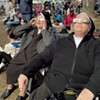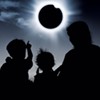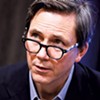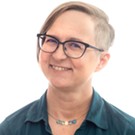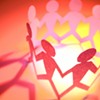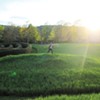Published January 17, 2006 at 11:39 p.m.
COLCHESTER -- The Saturday night potluck at Vermont's only mosque looked a lot like any other church supper. The plates were styrofoam. The forks were plastic. A line of kids waited to pour the orange soda.
But it was different, too. The aluminum trays held chickpea, rice and noodle dishes rather than meatloaf. Men and women sat on opposite sides of the room, divided by a gold curtain. And the congregation was multicultural -- 100 or so diners came from as far away as Singapore, Somalia, Yemen and Sri Lanka.
They were gathered to celebrate the Muslim holiday of Eid al-Adha. The feast honors Abraham's willingness to sacrifice his son to Allah. The Koran says that a sheep appeared before Abraham was to kill the boy, a sign that God wished to spare his life. The holiday, which marks the end of the annual pilgrimage to Mecca, was Tuesday, but the Islamic Society of Vermont held the dinner on Saturday so more people could attend.
Mariah Hussain brought a spicy noodle dish called mee hoom goreng. The Malaysian doctor wore a cream-colored headscarf over a bright-green, silk outfit called a baju kurung. The holiday is important to her, she said, "But I came for the food," she admitted with a sheepish smile.
Islamic Society spokesman Fareed Smith estimates there are between 3000 to 5000 Muslims in Vermont, nearly 1500 of whom visit the mosque. Smith, a convert whose legal first name is Leon, notes that this mosque serves as a community center as well as a worship space. Thanks to an influx of refugees and immigrants from Muslim countries, the state's Islamic population has grown significantly since the mosque was established in the late 1990s. Last Tuesday, the two-story brick building at Fort Ethan Allen was packed. "We're outgrowing the space," Smith said.
Mosque volunteer Mohamed Basha, an Indian immigrant who grew up in Burlington and is now a senior at Castleton State College, said that, despite conflicts raging in other parts of the world, Vermont is generally a welcoming place for Muslims. He pointed out that the three Abrahamic religions -- Christianity, Judaism and Islam -- are "95 percent the same." All three, for example, teach the story of Abraham, though in Christianity and Judaism the son he nearly sacrifices is Isaac; in Islam, it's Ishmael.
"At the end of the day, people look at our differences instead of our similarities," Basha said, "and that's when we have problems."
More By This Author
Speaking of...
-

Totally Transfixed: A Rare Eclipse on a Bluebird Day Dazzled Crowds in Northern Vermont
Apr 10, 2024 -

Dick Mazza Steps Down From Vermont Senate
Apr 8, 2024 -

Thingz From Yaad Brings Jamaican Cuisine to a Former Dining Hall in Colchester
Apr 2, 2024 -

Q&A: Howard Fisher Delivers Meals on Wheels With a Side of Good Cheer
Dec 20, 2023 -

Video: Howard Fisher Delivers Meals on Wheels
Dec 14, 2023 - More »
Comments
Comments are closed.
From 2014-2020, Seven Days allowed readers to comment on all stories posted on our website. While we've appreciated the suggestions and insights, right now Seven Days is prioritizing our core mission — producing high-quality, responsible local journalism — over moderating online debates between readers.
To criticize, correct or praise our reporting, please send us a letter to the editor or send us a tip. We’ll check it out and report the results.
Online comments may return when we have better tech tools for managing them. Thanks for reading.



































